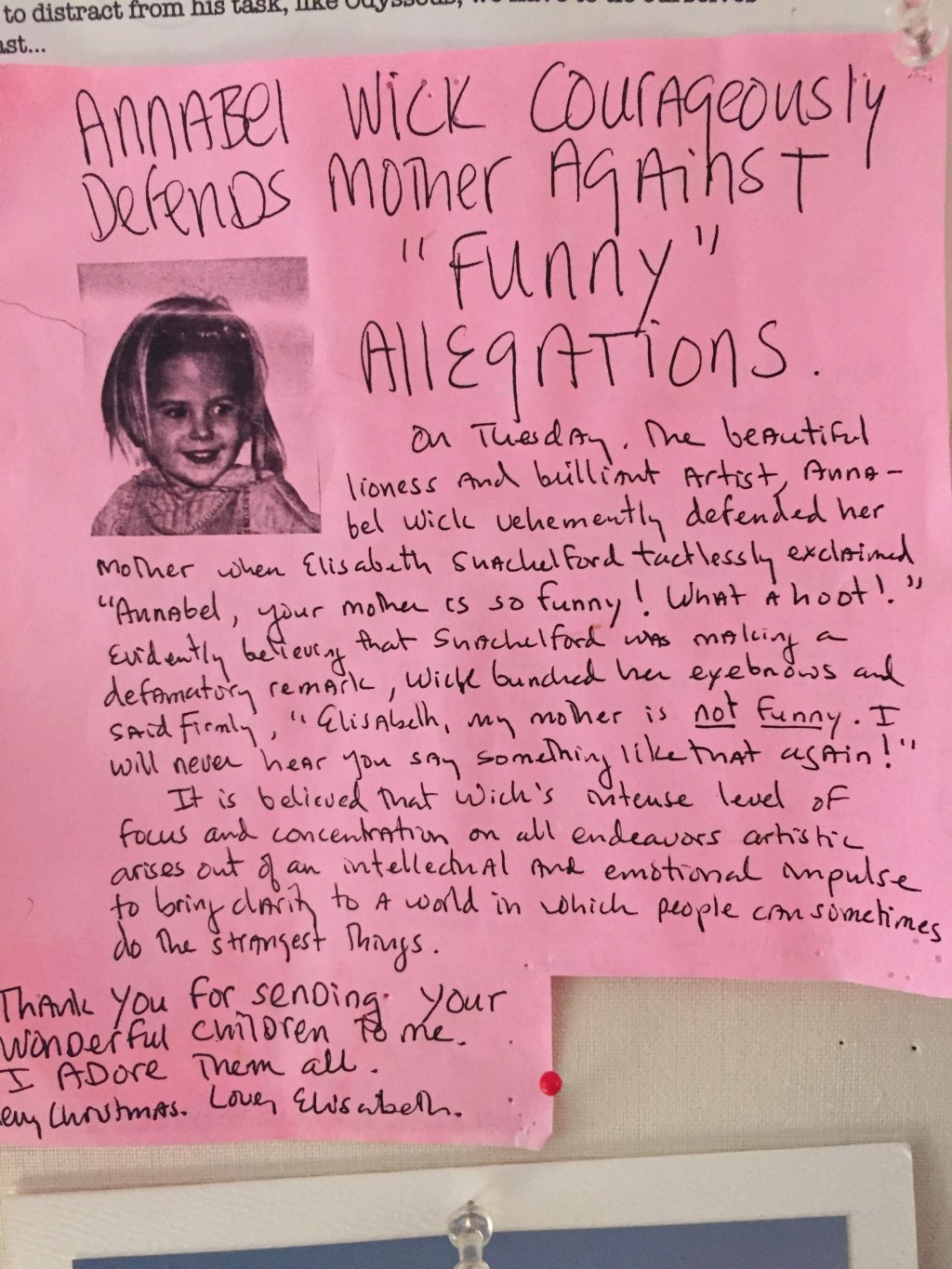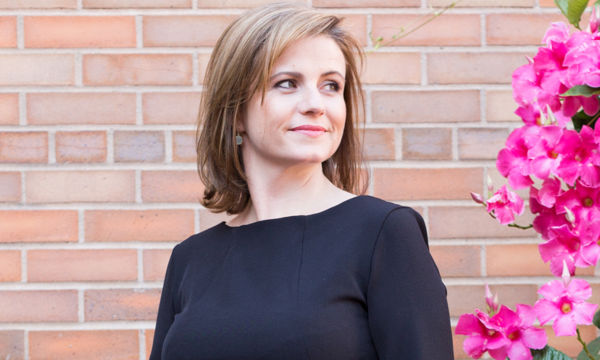Mom Knows Best: Annabel and Donna Wick on Genes, Jeans, and the Psychology of Motherhood
May 05, 2016
What’s it like to be raised by celebrated psychologist Donna Wick, who has specialized in parents and children since earning her doctorate at Harvard over 20 years ago? Apparently pretty great. MM.LaFleur customer associate Annabel Wick would know. In honor of Mother’s Day, we paid a visit to Annabel’s childhood home in Manhattan to meet her mom—and to get the scoop on Annabel’s style evolution.
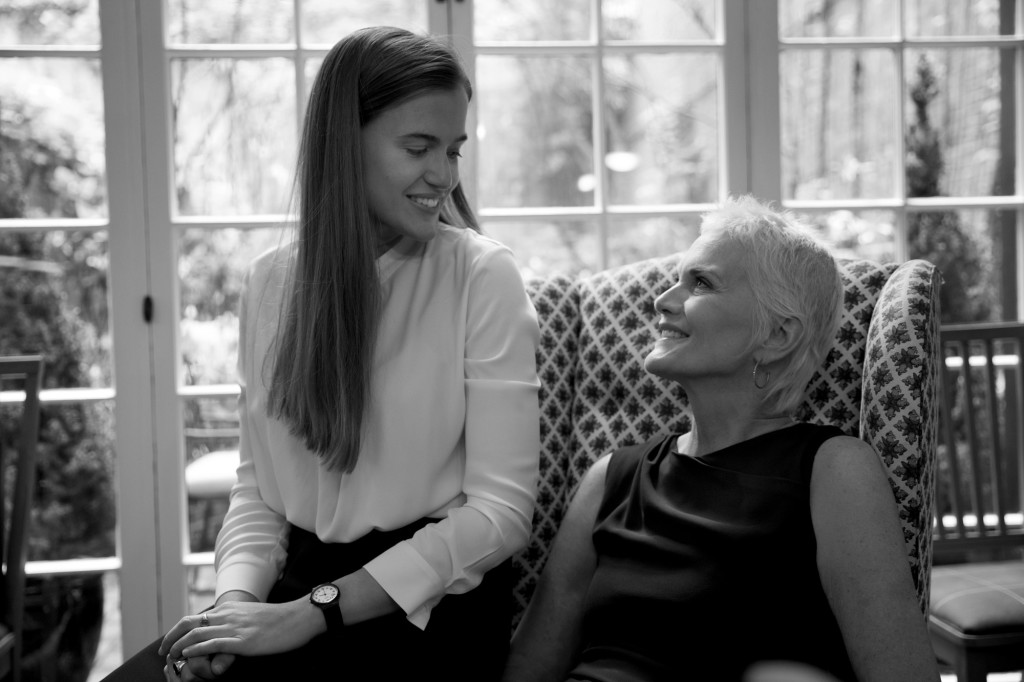
Annabel in the Apfel shirt and Donna in the Alex dress.
On Career
Donna: In my case, having children had everything to do with my career. When Annabel was a baby and her older sister was three, we moved to Cambridge, Massachusetts, and I began to take courses at Harvard. It was the mid-1980s, just when all the research was coming out about how women think differently from men, psychologically. I benefited enormously from being at Harvard at that time, studying women and children and adolescents in a way that hadn’t been done before, and wasn’t happening anywhere else. Would I have been interested in any of those subjects if I hadn’t had children, specifically girls? Probably not. Becoming a mother gave me a direction. I went through the whole process of getting my doctorate in my thirties, and I had my youngest daughter, Tally, in the middle of it. I was working all the time, but it was manageable. I didn’t have to be in an office at certain hours, and I had control over when I was going to write a paper—for the most part. Once, during a family ski vacation, I had to stay inside to work on a statistics paper. Of course, the kids were incredibly unhappy that I didn’t ski with them, but looking back on it, it wasn’t a bad lesson for them. I did what I needed to do, and sometimes you have to focus on certain priorities.
Annabel: My mom has always been a huge feminist, and she raised us with the belief that nothing should limit us as women, or should prescribe what a woman is. I remember her working very hard on her dissertation, and watching her get her diploma.
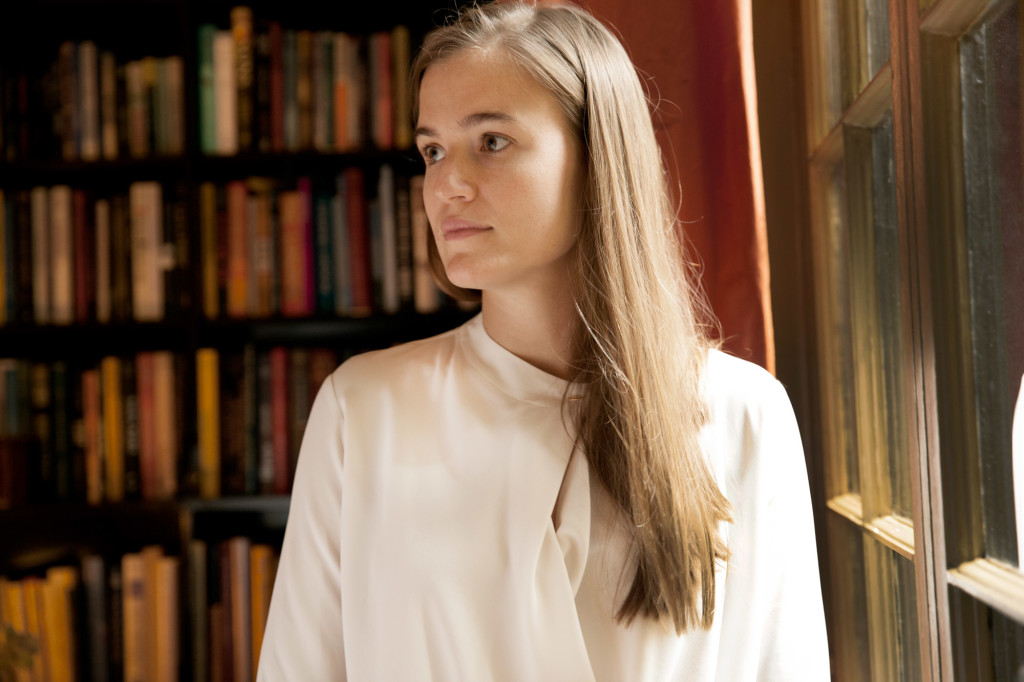
Annabel in the library in the Apfel shirt.
On Style
Annabel: My mom has always been incredibly stylish, although sometimes people gave her trouble for it. She’d go into a big meeting or a conference, and everyone would comment on her shoes or how much they loved her bag, and she’d be like, “I’m not here to talk about that.” And when we first moved to Cambridge, she wore a huge fur coat all the time, which wasn’t done there.
Donna: The idea of not being taken seriously because you look good—I mean, what’s that about? I always did my own thing, but luckily I wasn’t subjected to the pressures that a lot of women feel in a corporate environment. My first job out of college, in the early 1980s, was for a women’s workwear label called Streets & Company that eventually had several stores. Back then, women’s workwear was essentially menswear—a lot of bow ties and jackets. I hate seeing women fall into that trap. Obviously, you can’t wear a dress that shows cleavage, but you don’t need to conform to male expectations of what’s appropriate for the workplace, either. The fact that men don’t want to be “distracted”—that’s their problem.
Annabel: My mom has such fun with clothes, and that’s definitely something she’s passed on to me. I’ll buy a bright sweater or some ridiculous velvet jacket just because I get a kick out of it. I love looking at clothes as costumes.
Donna: Yeah, I think getting dressed is a blast. It’s one of the biggest reasons that I wish women’s credibility didn’t have to be tied to what they’re wearing.
Annabel: It took me years to appreciate some of my mom’s bolder choices. She gave me a velvet dress when I was ten, and I remember thinking, “This is hideous.”
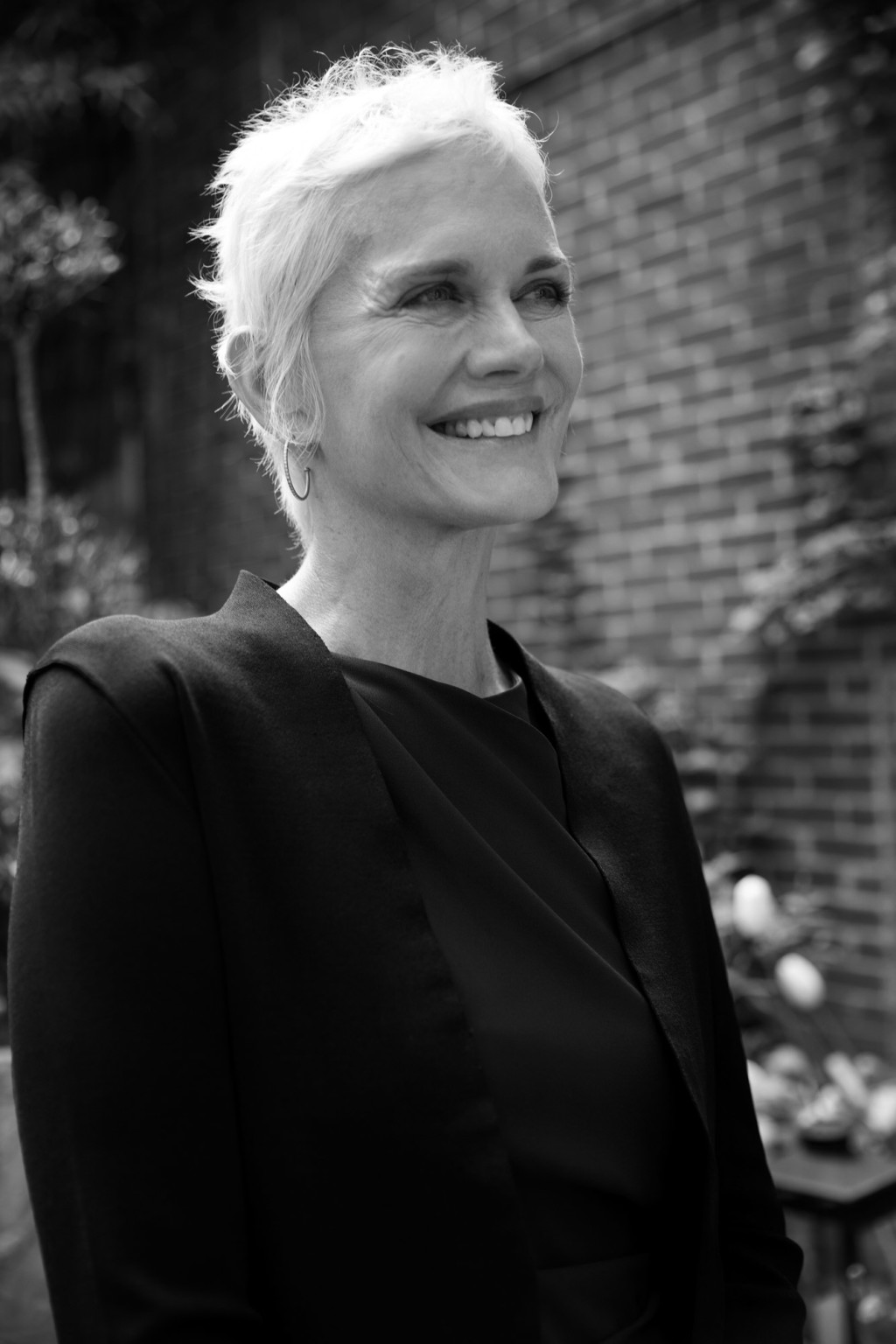
Donna in the garden in the Alex dress and Sant Ambroeus jardigan.
Donna: Annabel has never liked anything girly. Periodically we would go visit her grandmother and she’d have to put on a smock dress, and that would always create such a fight. She saw herself very much as a tomboy, and had her own distinct style that usually involved going to a rummage sale and buying boys’ clothes. I was a little mystified by it. It has evolved into this very cool look, but there was a definite period in the middle where I didn’t know what she was doing, and it seemed somewhat rebellious and experimental.
Annabel: I have friends whose moms are very hawkish about what they wear, but I never felt judged by you in that way. And I never wanted to wear anything scandalous, so it was never an I-can’t-let-you-out-of-the-house-in-that situation with me.
Donna: Yeah. Well, thank you for that. I think kids should be encouraged to wear what they want. I got to dress them for like, Christmas dinner. The rest of the time, it was up to them.
Annabel: Now we share almost everything in our closets.
Donna: We have actual fights over jeans. Are the Acne ones still your favorite?
Annabel: Yeah. I wore them earlier today, in fact. And I’ve stolen a bunch of your coats.
Donna: Between three girls, all of whom are more or less the same size—it has not always been pretty. But there’s been less theft lately.
Annabel: Sometimes my mom will buy a dress and then say, “I don’t know what I was thinking. This is way too young for me,” and she’ll give it to one of us. She recently gave me a floor-length taffeta plaid skirt. I have no idea where I’m going to wear that.
Donna: Annabel puts together things that I would never think of. With the dress I’m wearing now, she said, “Why don’t you wear it with those blue velvet oxfords?” And I thought, “What a good idea!” I’m always looking at her and thinking, “How did she do that?” But then sometimes she comes uptown and I think, “Have you been in those pants all weekend?”
Annabel: And usually, I have.
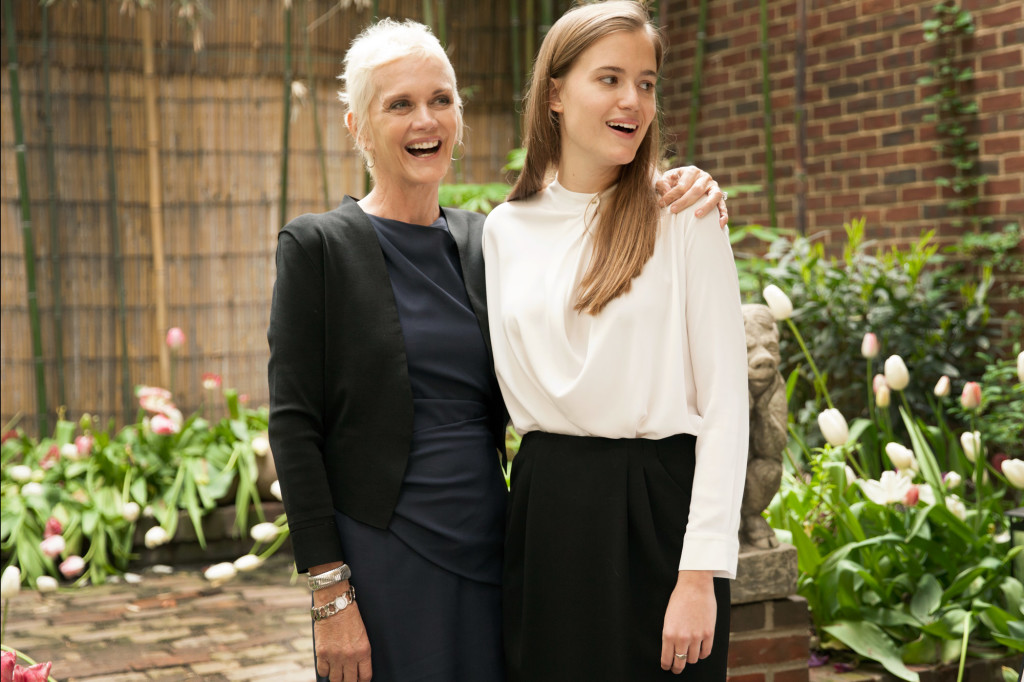
On Formative Moments
Annabel: There’s an infamous story of my mom totally losing her mind at this garden store when she was seven or eight months pregnant with my younger sister. My parents had ordered all of this outdoor furniture and it wasn’t finished when it was supposed to be, and the people at the store kept giving all of these dumb excuses, and my mom just went apeshit. We were young, and I remember my dad being like, “You guys should go play outside.” My mom definitely has a temper, my older sister has a temper, and I can have a temper. As I get older, I get less tolerant of ineptitude, which may not be a good thing. But that story is especially funny now that I work in customer experience.
Donna: I vividly recall that day, and I wish I hadn’t lost it in front of my poor children. But we had ordered a ton of furniture, and we’d given these guys eight months to get it together, and none of it had been done. And it was a very conscious decision on my part, albeit perhaps an unfortunate one, to use the fact that I was a pregnant woman to my advantage. I knew that they would give way. They were like, “Crazy lady’s gonna give birth in the office unless we do something!”
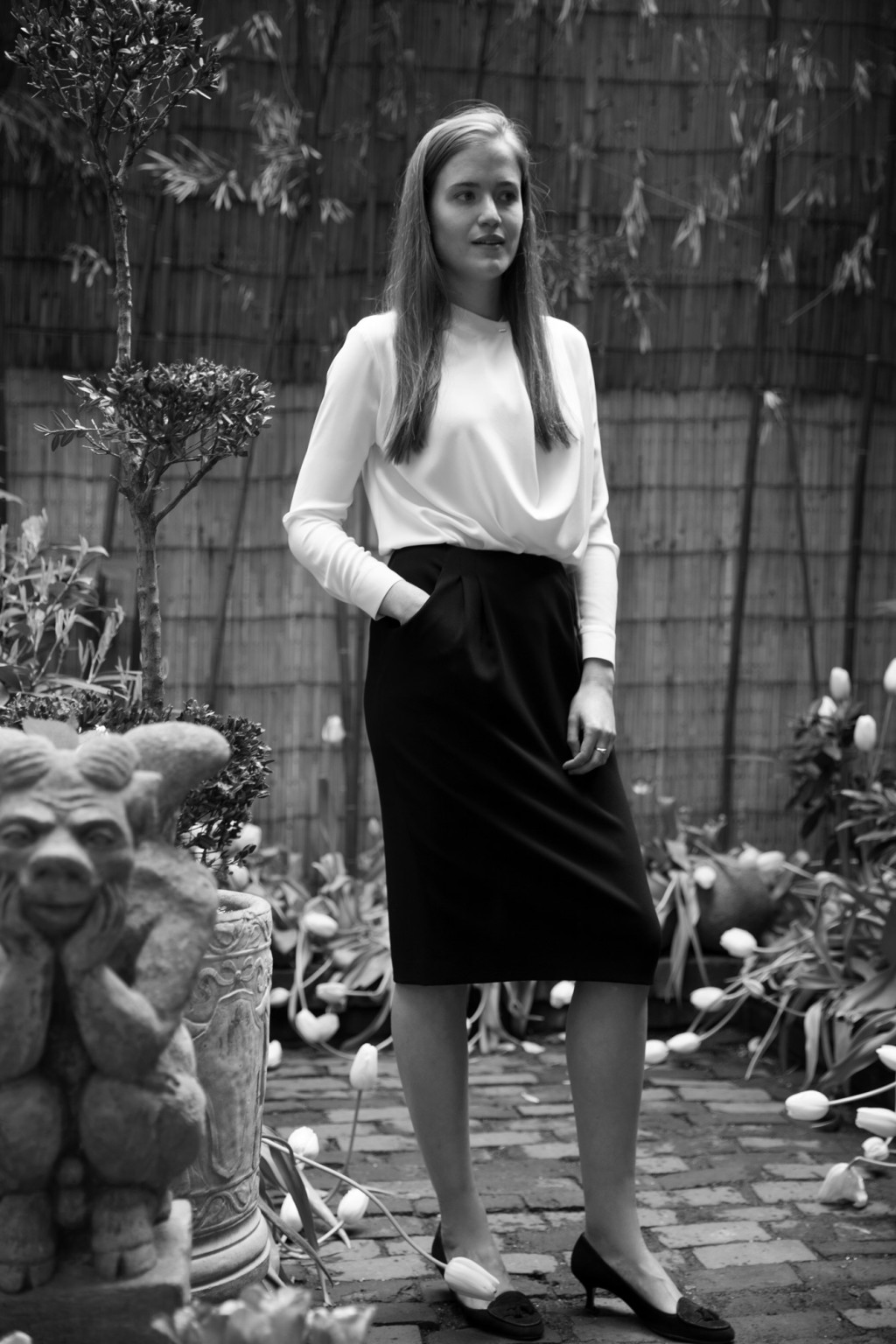
Annabel in the garden wearing the Apfel shirt and Williamsburg skirt.
On Shared Traits
Donna: We both have very broad backs.
Annabel: And we’re both control freaks, definitely. Stubborn.
Donna: Very stubborn. And fierce.
Annabel: Because my mom is a therapist, sometimes people will tell her very personal things with little introduction, and that happens to me too—maybe it’s a way of listening that I inherited from her. People I just met will confess things I don’t necessarily want to know.
Donna: Annabel has an unusual quality of attentiveness that she learned at a very early age.
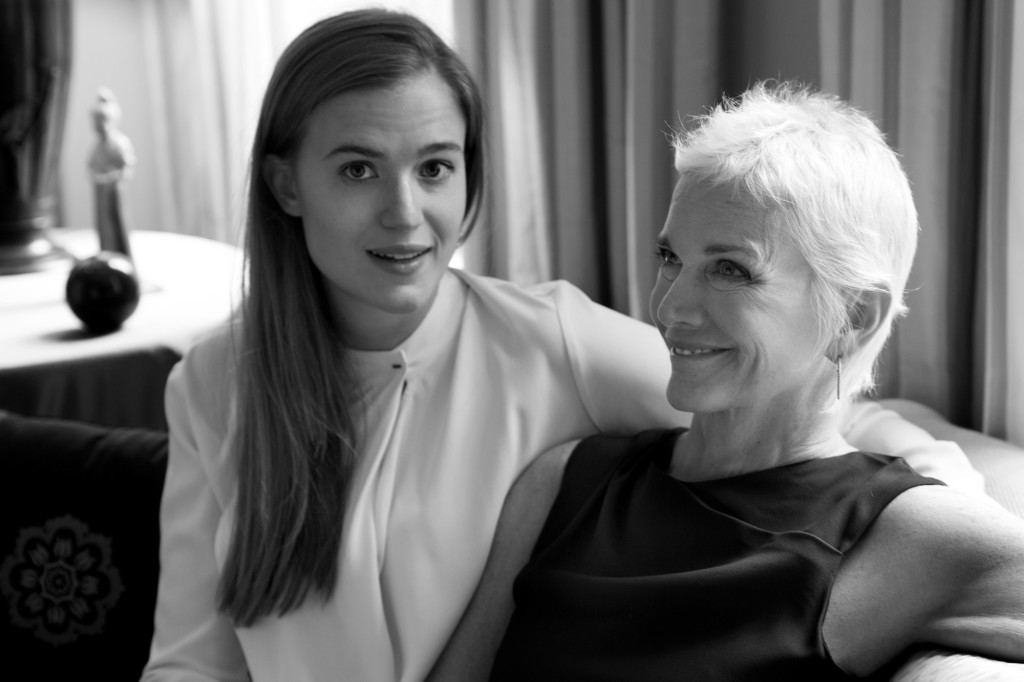
On Mother-daughter Rituals
Annabel: We both read the same books at the same time. But she’s a speed reader, so she’ll whip through them, and I take longer.
Donna: I must say that Annabel’s book choice for our spring vacation was so depressing and long that it’s going to take me a while to get over it.
Annabel: We read A Little Life by Hanya Yanagihara, which was very dark. I’m not sure I’d recommend it.
Donna: We also bike together. Although Annabel’s idea of biking with me is to put on her headphones and take off as fast as she can and leave me in the dust.
Annabel: I think our minds work very similarly.
Donna: Annabel has always had a deep fascination with how the world works. She’s very curious. Can I tell the story about the midgets?
Annabel: Mom, no.
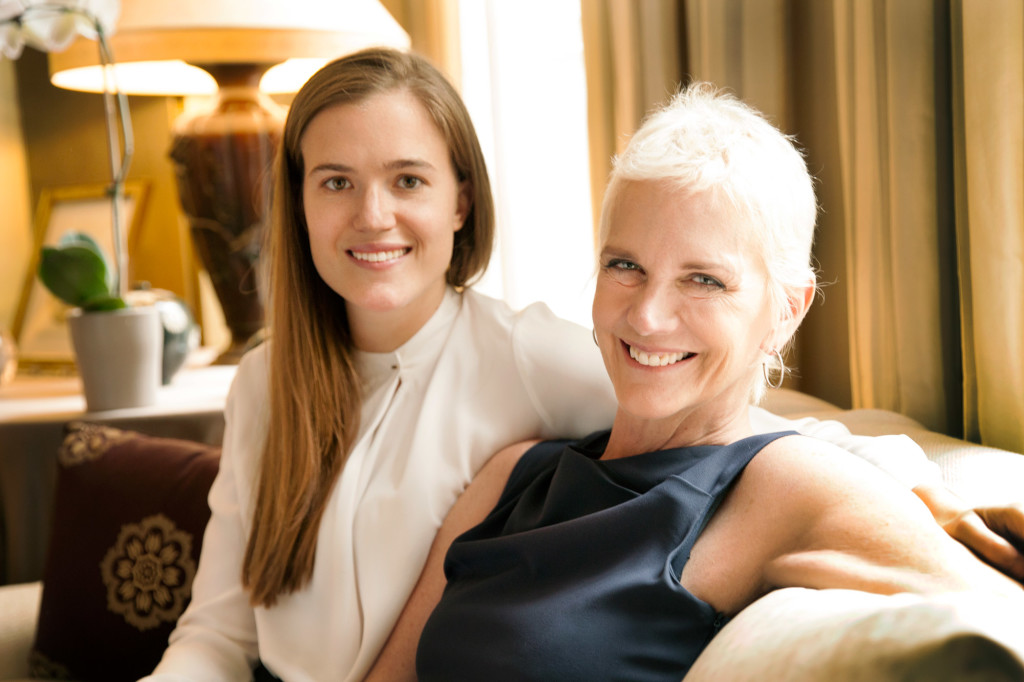
On Parenting
Donna: I believe that your children have to know that they come first, deep in their little souls. And that doesn’t mean you can’t have a big career, of course—but if you do, and your partner does too, and you have young kids, then you can’t do much else. You don’t have much of a social life, you don’t go to parties, you don’t do all the things that people come to New York to do. We had dinner together every night as a family when the kids were young. And no matter what else was going on out there in the city—and there were plenty of temptations—the kids came first.
Annabel: Growing up in New York City, I saw some bad parenting. But I always felt very close to my parents, maybe with the exception of a few teenage years. As a therapist, my mom talked me through tons of stuff—a lot of drama with friends, and coming-of-age things.
Donna: Many parents, especially in New York, have trouble enforcing boundaries. They don’t want their kids to get mad at them, but I’ve always believed the opposite. I remember when Annabel was in her more difficult years, I’d think, “I want Annabel to be afraid of me. It’s the only way she’s going to survive until adulthood!”
Annabel: And here I am.
Bonus: A four-year-old Annabel defends her mother’s honor in an account written by her teacher.
